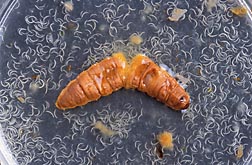Byron, Georgia, USA
July 25, 2019

Beneficial nematodes emerge from an infected insect host
Beneficial nematodes are used as biological control agents to fight a variety of insect pests that severely damage crops. However, in many cases the nematodes don't measure up to other control methods such as certain chemical pesticides.
A recent Agricultural Research Service (ARS) study, published in The Journal of Invertebrate Pathology, shows that beneficial nematodes (also called entomopathogenic nematodes) treated with pheromone extracts are more effective at killing an economically important insect—the pecan weevil—as well as the black soldier fly.
The pecan weevil is a major pecan pest in the Southeast as well as in Texas and Oklahoma, said David Shapiro-Ilan, an entomologist at the ARS Southeastern Fruit and Tree Nut Research Laboratory in Byron, Georgia. If left uncontrolled, it can reduce crop production up to 70 percent.
An advantage of using beneficial nematodes is that they are safe for humans and the environment and target only specific insects, Shapiro-Ilan said.
In earlier research, Shapiro-Ilan and his colleagues discovered that pheromones produced by beneficial nematodes direct their behavior—telling them to disperse or infect insects. With that in mind, they sought ways to use pheromones to enhance nematodes' behavior to kill more insect pests.
Since then, ARS has established a cooperative research agreement with Pheronym, an ag-biotech pest control company that develops and produces nematode pheromones that can be used to direct beneficial nematode behavior.
Shapiro-Ilan and his colleagues—ARS post-doctoral research associate Camila Oliveira-Hofman, Pheronym CEO Fatma Kaplan and Ed Lewis, head of the Department of Entomology, Plant Pathology and Nematology at the University of Idaho—tested the efficacy of Pheronym's beneficial nematodes exposed to pheromone extracts. The research showed that pheromone induced nematodes were 28 to 78 percent more effective in controlling pecan weevils and black soldier flies in greenhouse soil than non-exposed nematodes. In addition, a higher number of pheromone-treated nematodes invaded insect larvae compared to the non-treated nematodes.
This research is believed to be the first time a parasite's—the nematode—own pheromone was used to improve its effectiveness in attacking its host—the pecan weevil and black soldier fly, according to Shapiro-Ilan.
The study's paper, titled "Pheromone extracts act as boosters for entomopathogenic nematodes efficacy," was recently selected as a Research Highlight of 2019 by the Nematode Division of the Society of Invertebrate Pathology.
The Agricultural Research Service is the U.S. Department of Agriculture's chief scientific in-house research agency. Daily, ARS focuses on solutions to agricultural problems affecting America. Each dollar invested in agricultural research results in $20 of economic impact.